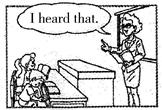题目内容
When you are learning English, you find it not clever to put an English sentence, word for word, into your own language. Take the sentence “How do you do?” as an example. If you looked up each word in the dictionary, once at a time, what is your translation (翻译)? It must be a wrong sentence in your own language.
Languages do not just have different sounds; they are different in many ways. Its important to master(掌握)the rules for word order in the study of English, too. If the speaker puts words in a wrong order, the listener can’t understand his sentence easily. Sometimes when the order of words in an English sentence is changed, the meaning of the sentence changes. But sometimes the order is changed, but the meaning of the sentence doesn’t change. Let’s see the different between the two parts of sentences.
“She only likes apples.” “Only she likes apples.”
“I have seen the film already.” “I have already seen the film.”
When you are learning English, you must do your best to get the spirit(精神实质) of the language and use it as the English speaker does.
小题1:From the passage we know that __________when we are learning English.
小题2:The writer thinks it is ________ in learning English.
小题3:We can learn from the passage that _________ .
小题4:“She only likes apples.”____________.
小题5:Which is the best title(题目)for this passage?
Languages do not just have different sounds; they are different in many ways. Its important to master(掌握)the rules for word order in the study of English, too. If the speaker puts words in a wrong order, the listener can’t understand his sentence easily. Sometimes when the order of words in an English sentence is changed, the meaning of the sentence changes. But sometimes the order is changed, but the meaning of the sentence doesn’t change. Let’s see the different between the two parts of sentences.
“She only likes apples.” “Only she likes apples.”
“I have seen the film already.” “I have already seen the film.”
When you are learning English, you must do your best to get the spirit(精神实质) of the language and use it as the English speaker does.
小题1:From the passage we know that __________when we are learning English.
| A.we shouldn’t put every word into our own language |
| B.we should look up every word in the dictionary |
| C.we need to put every word into our own language |
| D.we must read word by word |
| A.difficult to understand different sounds |
| B.possible to remember the word order |
| C.important to master the rules in different ways |
| D.easy to master the rules for word order |
| A.the meaning of an English sentence always changes with the order of words |
| B.the order of words can never change the meaning of an English sentence |
| C.sometimes a different order of words has a different meaning |
| D.if the order of words is different, the meaning of the sentence must be different |
| A.is the same as “Only she likes apples.” |
| B.is different from “Only she likes apples.” |
| C.means “She likes fruit except apples.” |
| D.means “She doesn’t like apples.” |
| A.Different orders, different meanings. |
| B.How to speak English. |
| C.How to put English into our own language. |
| D.How to learn English. |
小题1:A
小题1:C
小题1:C
小题1:B
小题1:D
本文大意是介绍在英语学习中要注意单词在句子中不同的顺序所代表的不同含义及英语的学习技巧的。
1.从第一段第一句可以看出“我们把句子一个单词一个单词地翻译成自己的语言是不明智的”,所以只有A符合题意.
2.A掌握不同的发音是困难的,B记住词的顺序是可能的,C从不同的方面掌握规则是重要的,D记住单词顺序的规则是容易的.从第二段可以看出C符合题意.
3.从文章中作者的观点可以看出,改变词的顺序,有时改变了句子的意思,有时候句子的意思不变,所以C答案,“有时候不同的顺序有不同的意思”是正确的.
4.“She only likes apples.”她仅仅喜欢苹果;“Only she likes apples.”仅仅她喜欢苹果,这两句话意思是不同的,答案A两句意思一样,答案C她喜欢除了苹果之外的水果,
答案D她不喜欢苹果,都不符合题意,选B.
5.从整篇文章可以看出本文是介绍如何学习英语的,所以选D.
1.从第一段第一句可以看出“我们把句子一个单词一个单词地翻译成自己的语言是不明智的”,所以只有A符合题意.
2.A掌握不同的发音是困难的,B记住词的顺序是可能的,C从不同的方面掌握规则是重要的,D记住单词顺序的规则是容易的.从第二段可以看出C符合题意.
3.从文章中作者的观点可以看出,改变词的顺序,有时改变了句子的意思,有时候句子的意思不变,所以C答案,“有时候不同的顺序有不同的意思”是正确的.
4.“She only likes apples.”她仅仅喜欢苹果;“Only she likes apples.”仅仅她喜欢苹果,这两句话意思是不同的,答案A两句意思一样,答案C她喜欢除了苹果之外的水果,
答案D她不喜欢苹果,都不符合题意,选B.
5.从整篇文章可以看出本文是介绍如何学习英语的,所以选D.

练习册系列答案
相关题目
 hours passed and the exam came to an end. Then the professor began to collect the papers. The students no longer looked confident. They seemed worried. No one spoke as the professor faced the class with the papers in her hand.
hours passed and the exam came to an end. Then the professor began to collect the papers. The students no longer looked confident. They seemed worried. No one spoke as the professor faced the class with the papers in her hand.